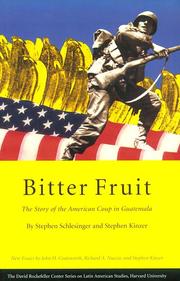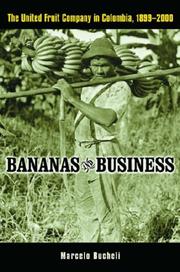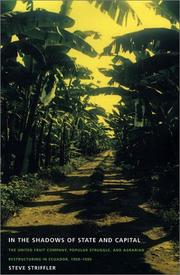| Listing 1 - 10 of 17 | << page >> |
Sort by
|
Book
ISBN: 3783905486 Year: 1975 Publisher: Stein (Nürnberg) : Freiburg [Schweiz] : Laetare-Verlag ; Imba-Verlag,
Abstract | Keywords | Export | Availability | Bookmark
 Loading...
Loading...Choose an application
- Reference Manager
- EndNote
- RefWorks (Direct export to RefWorks)
Book
Year: 1914 Publisher: Garden City, N.Y. : Doubleday, Page & Company,
Abstract | Keywords | Export | Availability | Bookmark
 Loading...
Loading...Choose an application
- Reference Manager
- EndNote
- RefWorks (Direct export to RefWorks)
Fruit trade --- Bananas. --- United Fruit Company --- Tropics.
Book
ISBN: 1282921002 9786612921001 0822385287 Year: 2003 Publisher: Durham : Duke University Press,
Abstract | Keywords | Export | Availability | Bookmark
 Loading...
Loading...Choose an application
- Reference Manager
- EndNote
- RefWorks (Direct export to RefWorks)
The history of banana cultivation and its huge impact on Latin American, history, politics, and culture.
Banana trade --- History. --- United Fruit Company

ISBN: 067401930X Year: 2005 Publisher: Cambridge (Mass.) : Harvard University, David Rockefeller Center for Latin American Studies,
Abstract | Keywords | Export | Availability | Bookmark
 Loading...
Loading...Choose an application
- Reference Manager
- EndNote
- RefWorks (Direct export to RefWorks)
United Fruit Company. --- Guatemala --- United States --- History --- Foreign relations
Book
Year: 1921 Publisher: Braunschweig : Westermann,
Abstract | Keywords | Export | Availability | Bookmark
 Loading...
Loading...Choose an application
- Reference Manager
- EndNote
- RefWorks (Direct export to RefWorks)
Fruit trade. --- Banana trade. --- United Fruit Company. --- Central America --- Commerce.
Book
ISBN: 9783035803969 Year: 2022 Publisher: Zurich : Diaphanes,
Abstract | Keywords | Export | Availability | Bookmark
 Loading...
Loading...Choose an application
- Reference Manager
- EndNote
- RefWorks (Direct export to RefWorks)
The establishment of the United Fruit Company as a global political agent with its banana plantations was met with considerable resistance. Now the company’s photographic records are the focal point of Archive Matter as it examines photography’s historical and political impact through the argument that this overlooked, but important, archive made capitalist expansion into the Caribbean possible. Author Liliana Gómez examines the images from within their “optical unconscious” and via the archive’s silences and omissions. The implication of these silences, Gómez argues, is the attempt to conceal the violence embedded within the realities of the plantations’ daily operations and corporate efforts to “modernize” the Caribbean.
Fruit trade --- History --- United Fruit Company --- Political activity
Book
Abstract | Keywords | Export | Availability | Bookmark
 Loading...
Loading...Choose an application
- Reference Manager
- EndNote
- RefWorks (Direct export to RefWorks)
United Fruit Company Strike, Ciénaga, Magdalena, Colombia, 1928 --- Massacres --- Sources. --- History --- Sources.
Book
Year: 1936 Publisher: New York : [publisher not identified],
Abstract | Keywords | Export | Availability | Bookmark
 Loading...
Loading...Choose an application
- Reference Manager
- EndNote
- RefWorks (Direct export to RefWorks)
Banana trade. --- Working class --- United Fruit Company. --- Central America --- Caribbean Sea. --- Social conditions.

ISBN: 1479838225 9781479838226 0814799345 9780814799345 Year: 2005 Publisher: New York, NY
Abstract | Keywords | Export | Availability | Bookmark
 Loading...
Loading...Choose an application
- Reference Manager
- EndNote
- RefWorks (Direct export to RefWorks)
For well over a century, the United Fruit Company (UFCO) has been the most vilified multinational corporation operating in Latin America. Criticism of the UFCO has been widespread, ranging from politicians to consumer activists, and from labor leaders to historians, all portraying it as an overwhelmingly powerful corporation that shaped and often exploited its host countries. In this first history of the UFCO in Colombia, Marcelo Bucheli argues that the UFCO's image as an all-powerful force in determining national politics needs to be reconsidered. Using a previously unexplored source—the internal archives of Colombia's UFCO operation—Bucheli reveals that before 1930, the UFCO worked alongside a business-friendly government that granted it generous concessions and repressed labor unionism. After 1930, however, the country experienced dramatic transformations including growing nationalism, a stronger labor movement, and increasing demands by local elites for higher stakes in the banana export business. In response to these circumstances, the company abandoned production, selling its plantations (and labor conflicts) to local growers, while transforming itself into a marketing company. The shift was endorsed by the company's shareholders and financial analysts, who preferred lower profits with lower risks, and came at a time in which the demand for bananas was decreasing in America. Importantly, Bucheli shows that the effect of foreign direct investment was not unidirectional. Instead, the agency of local actors affected corporate strategy, just as the UFCO also transformed local politics and society.
Banana trade --- Banana industry --- Fruit trade --- History --- United Fruit Company --- I︠U︡naĭted frut kompani --- United Fruit (Firm) --- UFCO (United Fruit Company) --- Cuyamel Fruit Company --- Boston Fruit Company --- United Brands Company --- History. --- BANANE --- COMMERCIO --- COLOMBIA. --- Banane --- Commerce --- Histoire

ISBN: 9780822328636 Year: 2002 Publisher: Durham, NC Duke University Press
Abstract | Keywords | Export | Availability | Bookmark
 Loading...
Loading...Choose an application
- Reference Manager
- EndNote
- RefWorks (Direct export to RefWorks)
Banana trade --- Peasants --- Land reform --- Capitalism --- Employees --- Political activity --- History --- Political activity --- History --- History --- History --- United Fruit Company --- History. --- Ecuador --- Politics and government
| Listing 1 - 10 of 17 | << page >> |
Sort by
|

 Search
Search Feedback
Feedback About UniCat
About UniCat  Help
Help News
News